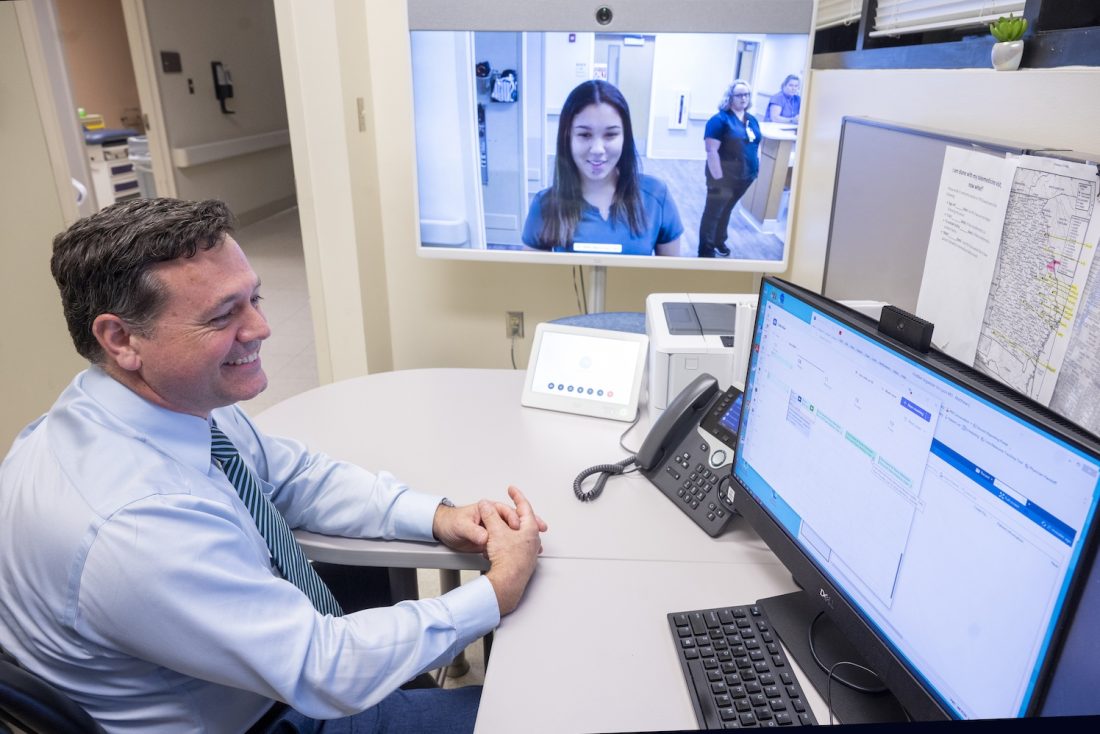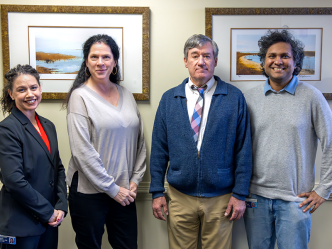The United States will face a physician shortage of up to 86,000 doctors over the next decade, according to a recent study by the Association of American Medical Colleges.
One of the main reasons for this projected shortage is that a large portion of the physician workforce is nearing the traditional retirement age over the next 10 years. Physicians ages 65 and over make up 20% of the clinical workforce and those between the ages of 55 and 64 make up 22%.
“Rural communities are already getting hit particularly hard by this, because these are communities where there is already a physician shortage,” said Matt Lyon, MD, director of the Center for Digital Health for the Medical College of Georgia at Augusta University. “That’s why digital health is extremely important for providing access to health care across rural Georgia.”
The center uses connectivity technology to decrease health care disparities in Georgia by digitally connecting patients and providers to the academic health care resources at MCG and Wellstar MCG Health, he said.
“Telehealth, in general, is longstanding here at MCG, but over the last few years, with the advent of new technology, we’ve been able to really expand what we can do with rural Georgia. We can provide equity access to high-quality health care through digital means,” Lyon said, adding that digital health can help patients ranging across the lifespan, from yet-to-be-born babies to geriatrics. “We can now bring a specialist into a rural community so that patients can actually have that access. And it’s cost effective because the specialist isn’t having to travel to rural Georgia.”
Tremendous growth in digital health
Since partnering with Wellstar Health System in 2023, MCG has been able to use digital health to reach more rural hospitals and their patients because Wellstar is the largest and most integrated health care system in Georgia, Lyon said.
“We’re currently expanding from 15 rural county hospitals to 19, so that is a major increase,” Lyon said. “We’re adding more hospitals, but also more patients at each site. Currently, we’ve treated around 6,000 patients, and we’ve had about 16,000 encounters because we see patients more than one time if they are admitted to the rural hospital.”
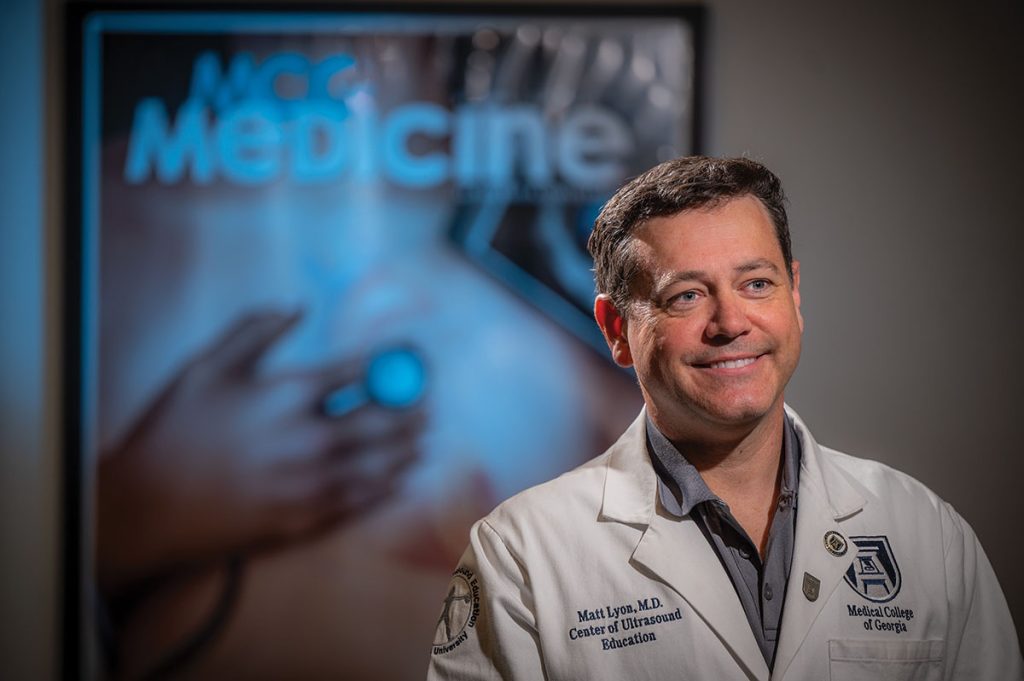
“Our students are going to be the best prepared medical students when they graduate for a digital health future than anybody in the country.”
Matt Lyon, MD, director of the Center for Digital Health for the Medical College of Georgia
With MCG’s digital health expansion across the state, more patients are being able to remain in their local hospital rather than being transferred to Wellstar MCG Health Medical Center in Augusta. Allowing patients to remain in their communities results in better treatment outcomes and keeps these local hospitals economically viable, Lyon said.
“Currently, our transfer rate is around 27%, so we keep the majority of patients we see in their rural hospitals,” Lyon said. “We work quickly to identify a patient’s need because some of our rural hospitals that we partner with are more than five hours away from Augusta. There would be no way for those citizens in rural counties to have quick access to some of the specialists if it wasn’t for digital means.”
MCG is also taking a lead role in teaching its benefits to future physicians, Lyon said.
“We train all of our students in digital health before they even go out to start seeing patients in clerkships,” Lyon said. “Our students are going to be the best prepared medical students when they graduate for a digital health future than anybody in the country. It is a pillar of what sets MCG apart when people are looking for where they’d like to get their medical education.”
Preparing for the future
Augusta University President Russell T. Keen said MCG understands how crucial expanding digital health care access will be for students and their future patients.
“With nearly 100,000 physicians expected to retire in the next decade, the health care system faces a critical shortage,” Keen said. “As the fourth largest medical school in the country, with 304 students in each entering class, it’s clear that traditional approaches alone won’t meet the demand. We must embrace innovation and technology in transformative ways to expand access, enhance training and reimagine how care is delivered.”
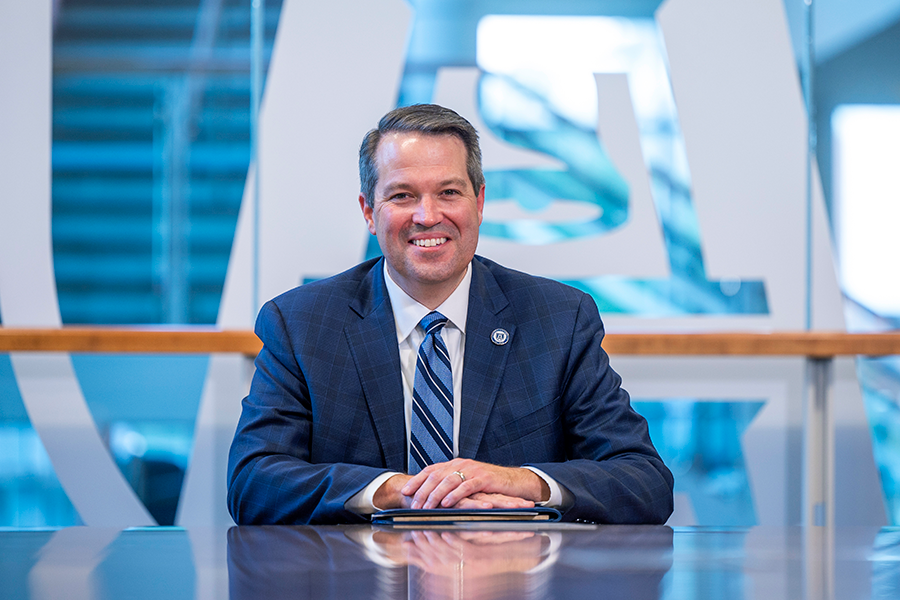
“As the fourth largest medical school in the country, with 304 students in each entering class, it’s clear that traditional approaches alone won’t meet the demand. We must embrace innovation and technology in transformative ways to expand access, enhance training and reimagine how care is delivered.”
Augusta University President Russell T. Keen
U.S. Rep. Earl L. “Buddy” Carter, R-Ga., was instrumental in helping to secure $1 million for Augusta University in FY23 to support MCG’s Center for Digital Health.
As a pharmacist and small business owner from Pooler, Georgia, serving in Congress representing Georgia’s District 1, Carter is dedicated to working toward a health care system that provides choices, lower costs and better services throughout the state.
“We all want the same thing in health care. We want accessibility, affordability and quality. Telehealth gives us the opportunity to have all three of those,” Carter said. “And that’s why I’m so proud of what we’re doing at MCG and Augusta University, particularly as it relates to the rural hospitals. Rural hospitals struggle. We know that. We need to keep them in business. We need to keep them as part of the community, so that’s why this is so vitally important.”
A key example of that is Emanuel Medical Center in underserved Swainsboro. Like many people in rural communities, residents in Emanuel County have high rates of things like diabetes and obesity that can lead to more serious conditions such as strokes or cancer.
“Emanuel County has a lot of health care needs,” said Damien Scott, chief executive officer of Emanuel Medical Center. “As my physicians have gotten older, we’ve seen less and less of these physicians who could do a little of everything and more and more of a specialty, and so it made it really challenging.”
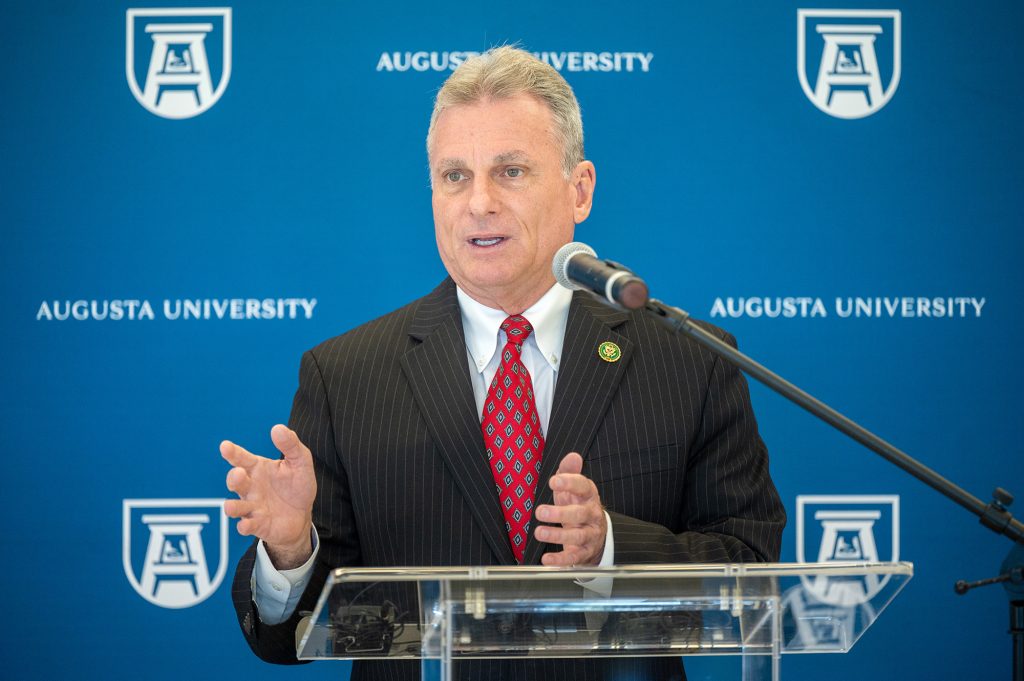
“We all want the same thing in health care. We want accessibility, affordability and quality. Telehealth gives us the opportunity to have all three of those.”
U.S. Rep. Buddy Carter, R-Ga.
By partnering with MCG, Emanuel Medical Center can instantly gain access to specialty care that will save people’s lives, Scott said.
“At this point, now, you can get the care just as fast in Emanuel County as you can anywhere else,” he said. “Ten years from now, this will be so commonplace, and it’ll be in every rural facility as part of just a standard of care.”
Treating all of Georgia
When U.S. Rep. Sanford D. Bishop Jr., D-Ga., who represents District 2, first became a member of Congress in 1993, he immediately recognized that his district suffered from “extraordinary health disparities,” he said.
“We had an extraordinarily high number of bad health outcomes including heart disease, cancer, diabetes, strokes and various other diseases like obesity and kidney disease, which really affected the well-being of the people in the district,” Bishop said. “I wanted to use my service in Congress to try to improve the quality of life for all of the people in our district, and, of course, health care is one of those essential elements for a high quality of life. So, I’ve made it my purpose to use the opportunity that I have as a member of Congress to try to improve those health care disparities, and, of course, telehealth is one of those opportunities.”
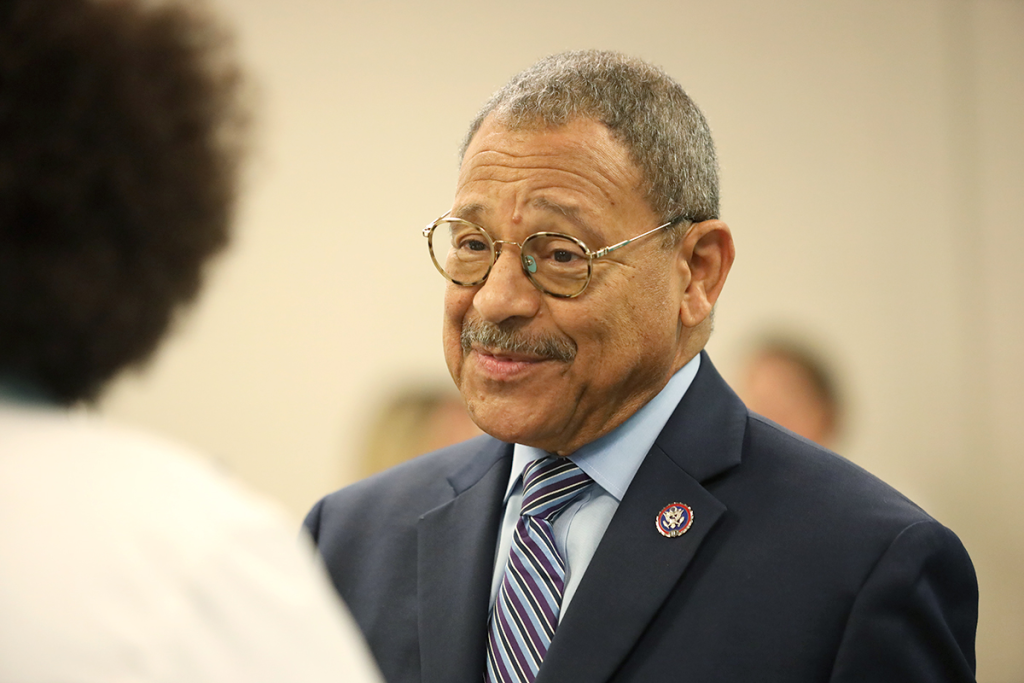
“I think the example that is set by Medical College of Georgia and Augusta University is one that can be followed or replicated to the benefit of people all across the country.”
U.S. Rep. Sanford D. Bishop Jr., D-Ga.
Since 2017, Bishop has worked to help MCG secure a number of grants to help fund telehealth initiatives that will help expand medical care access to rural Georgians. He has also prioritized the need for greater broadband infrastructure to help with such initiatives.
“I realized that broadband could be utilized for telehealth, which would bring access for people who are in rural communities who don’t always have person-to-person contact with medical providers,” Bishop said. “Of course, being able to utilize the digital tools to make sure that people can be connected with specialists and with primary care physicians facilitates a much more rigorous and consistent access to health care.”
While telehealth will never replace the importance of in-person care and the need for local access to health care services, Bishop said the expansion of digital health is the “wave of the future” for increasing access to care and MCG’s digital health program has been a leader throughout the country.
“I think the example that is set by Medical College of Georgia and Augusta University is one that can be followed or replicated to the benefit of people all across the country,” he said. “It’s an excellent model because the more doctors and providers who have the knowledge of how to utilize telehealth, the better the results will be for all of the people that they serve.”
Trust is key
As the director of the Center for Digital Health, Lyon said he understands the importance of training medical students to make sure they are comfortable communicating with their patients because trust is a key component to the program’s success.
“This is the way that physicians from now on are going to practice medicine,” Lyon said. “MCG is the first and only medical school that I know of where students have real patient interactions through telehealth in the very beginning of medical school before they even go to their clerkship rotations. So, as they’re learning how to be a traditional doctor with hands-on patients and doing physical exam skills and inpatient interactions, they’re also learning how to do it using digital means.”
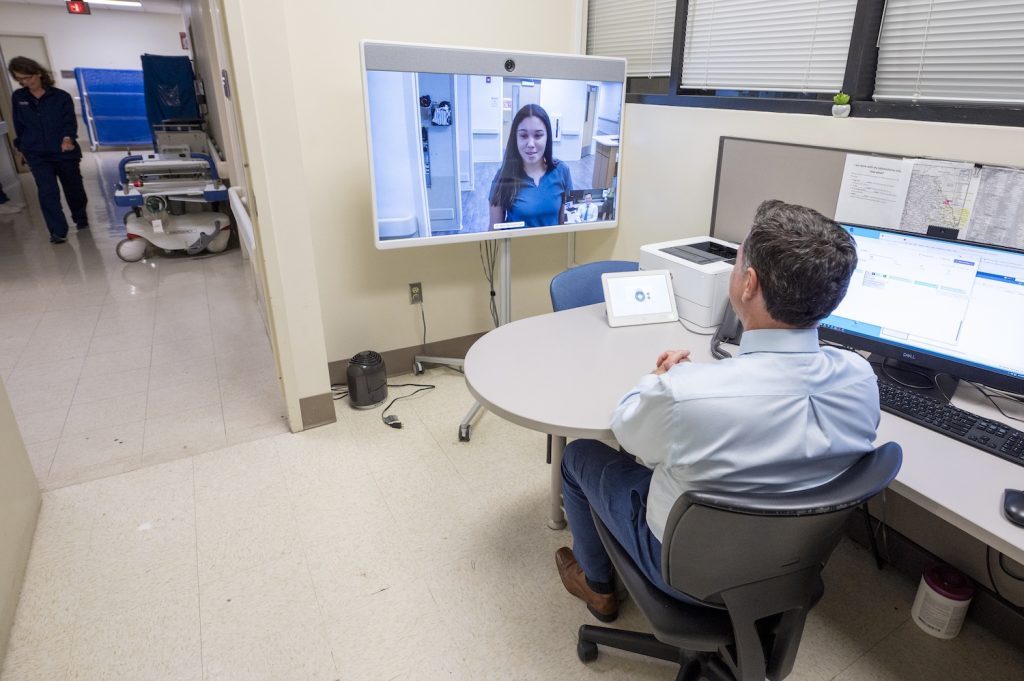
“MCG is the first and only medical school that I know of where students have real patient interactions through telehealth in the very beginning of medical school before they even go to their clerkship rotations.”
Matt Lyon, MD, director of the Center for Digital Health for the Medical College of Georgia
Building that trust has paid off with the patients they see, Lyon said.
“Our patients value being able to remain in their local hospital where they can get the care they need, and they’ve been very accepting of seeing the doctor on the TV,” he said. “We have yet to have a patient not be willing to be treated through digital health, which is really remarkable considering the number of people we have treated. I’m very appreciative that our patients in rural Georgia see the value in digital health, and they want to keep using it whenever they can.”
 Augusta University
Augusta University
